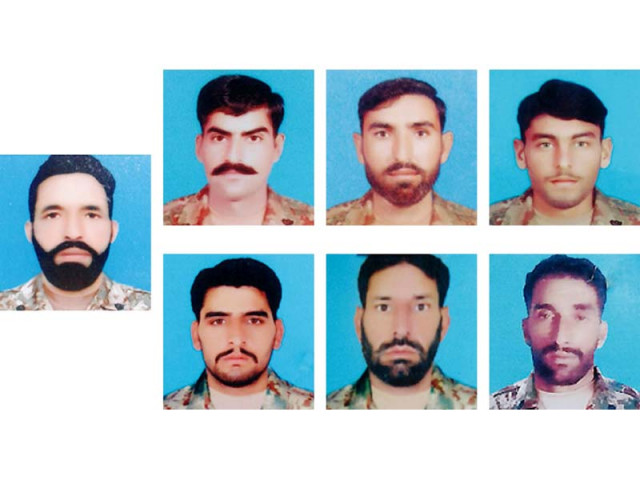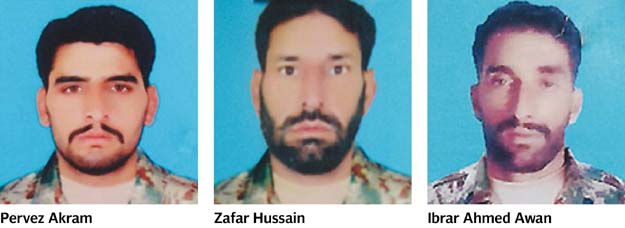7 soldiers martyred in India’s deadliest provocation
Islamabad warns Delhi shelling may lead to ‘strategic miscalculation’

Islamabad warns Delhi shelling may lead to ‘strategic miscalculation’; COAS says Pakistan will continue to give an effective response
Monday’s incident compelled Pakistani government and strategists to analyse the current situation with an aim to find out what the Narendra Modi administration wanted to achieve by ratcheting up tensions along the LoC.
7 soldiers killed in Indian firing along LoC
Although the two nuclear-armed rivals have frequently exchanged fire at the LoC and Working Boundary in recent months, this is the first time since 2003 that the Pakistan Army has suffered causalities in such a large number in a single day.

That was the reason the reaction from Pakistan’s political and military leadership was swift, condemning the Indian aggression with a vow to hit back befittingly.
Those who lost their lives while on duty include Havaldar Zafar Hussain, Havaldar Ibrar Ahmed Awan, Lance Naik Muhammad Shoukat, Lance Naik Muhammad Haleem, Sepoy Pervez, Sepoy Muhammad Ilyas and Sepoy Muhammad Tanveer.
Their funeral prayers, held in Jhelum, were attended by army chief General Raheel Sharif and other senior army officials. In a statement, the Inter-Services Public Relations (ISPR) said the army chief was briefed on the current situation along the LoC after the funeral.
According to the military’s media wing, the army chief said Pakistan would continue to give an effective response to Indian provocation and pledged to leave ‘no stone unturned to defend the motherland’.
On the diplomatic front, Foreign Secretary Aizaz Ahmed Chaudhry summoned Indian High Commissioner Gutam Bumbanwalay and condemned the “unprovoked ceasefire violation by the Indian occupation forces on the LoC, resulting in the Shahadat of seven Pakistani soldiers in Bhimber area.”
According to an official handout, the foreign secretary deplored increasing Indian ceasefire violations at the LoC and Working Boundary, especially in the last two months. “This was against the 2003 ceasefire understanding and the principles of international law,” he told the Indian envoy.
Indian troops violate ceasefire along LoC for third time today
Chaudhry emphasised that this belligerent attitude of Indian occupation forces was a serious threat to regional peace and security and might lead to a strategic miscalculation. The foreign secretary asked Bumbanwalay to convey to New Delhi that it must stop the provocative firing and observe the ceasefire.

“Pakistan is pursuing a policy of restraint, which should not be construed as a sign of weakness. The armed forces of Pakistan do not initiate fire, but will always respond in a befitting manner, if fired upon,” he said.
In a separate statement, Adviser to Prime Minister on Foreign Affairs Sartaj Aziz also denounced India’s unprovoked firing on the LoC. He expressed grave concern over the increased frequency and duration of Indian indiscriminate firing, deliberately targeting villages and civilian populated areas.
Aziz said due to Indian shelling at least 26 civilians have been killed and over 100 others, including women and children, wounded, adding that this was in complete violation of the 2003 Ceasefire Understanding and international law.
Aziz expressed apprehension that the Indian actions, which constituted a threat to maintenance of peace and security, might lead to strategic miscalculation. He emphasised that Pakistan was exercising maximum restraint in the face of Indian belligerence.
“Pakistan is urging the UN Military Observer Group (to send an urgent report to the UN Security Council to inform them about the serious ceasefire violations on LoC and the unwarranted escalation of tension between the two countries,” he further said.
What does this India provocation means?
Tensions between Pakistan and India have been running high since July when India unleashed a brutal crackdown on Kashmiris protesting against the extrajudicial killing of a prominent freedom fighter, Burhan Wani.
But the relationship hit a new low when at least 18 Indian soldiers were killed on Sep 18 in a militants attack on an army base at Uri area in Indian Occupied Kashmir (IOK). Immediately after the attack, India pointed the finger at Pakistan, a charge Islamabad strongly dismissed.
A few days after the Uri attack, Indian military claimed that it had conducted ‘surgical strikes’ inside Pakistani part of Kashmir against alleged ‘terror launch-pads.’ Pakistan strongly rebutted the claim and termed the Indian move to portray routine exchange of fire as surgical strikes as an attempt to divert global attention from the ongoing unrest in Kashmir.
Since then the two countries have exchanged fire along the LoC and Working Boundary. But of late India has started using artillery, something that has set alarm bells ringing in Pakistan. The two countries have never used artillery since the 2003 when the landmark ceasefire agreement came into effect.
A senior Foreign Office official said the main aim of India behind this escalation was to deflect attention from Kashmir, which was now getting completely out of control of the Modi administration.
“India wants to create chaos and mess, so that the world forgets about Kashmir’s situation and focus more on Indo-Pakistan tensions,” argued the official, who spoke on the condition of anonymity.
A senior military official pointed out that India wanted to provoke Pakistan in the hope that “we [Pakistan] may commit some strategic blunder.” “We will not get provoked,” the official said, adding that the armed forces, however, would defend the country at all costs.
Pakistan also feels that the Indian aggression at the LoC could be aimed at undermining the multi-billion dollar China-Pakistan Economic Corridor (CPEC) project. “There appears to be a certain pattern evolving in recent months. On the one hand, there is a sudden spike in terrorist attacks in Balochistan, and on the other, there is the worst escalation on the LoC,” he said.
“This is what offensive defence is all about,” the official said, alluding to the notorious doctrine advocated by Indian National Security Adviser Ajit Doval to deal with Pakistan.
But despite the Indian aggression, officials said, Pakistan would not get indulged in any conflict but would fight the battle on the diplomatic front. “We will hit India where it hurts the most and that is to expose its brutalities in the IOK,” the official added.
Published in The Express Tribune, November 15th, 2016.


















COMMENTS
Comments are moderated and generally will be posted if they are on-topic and not abusive.
For more information, please see our Comments FAQ